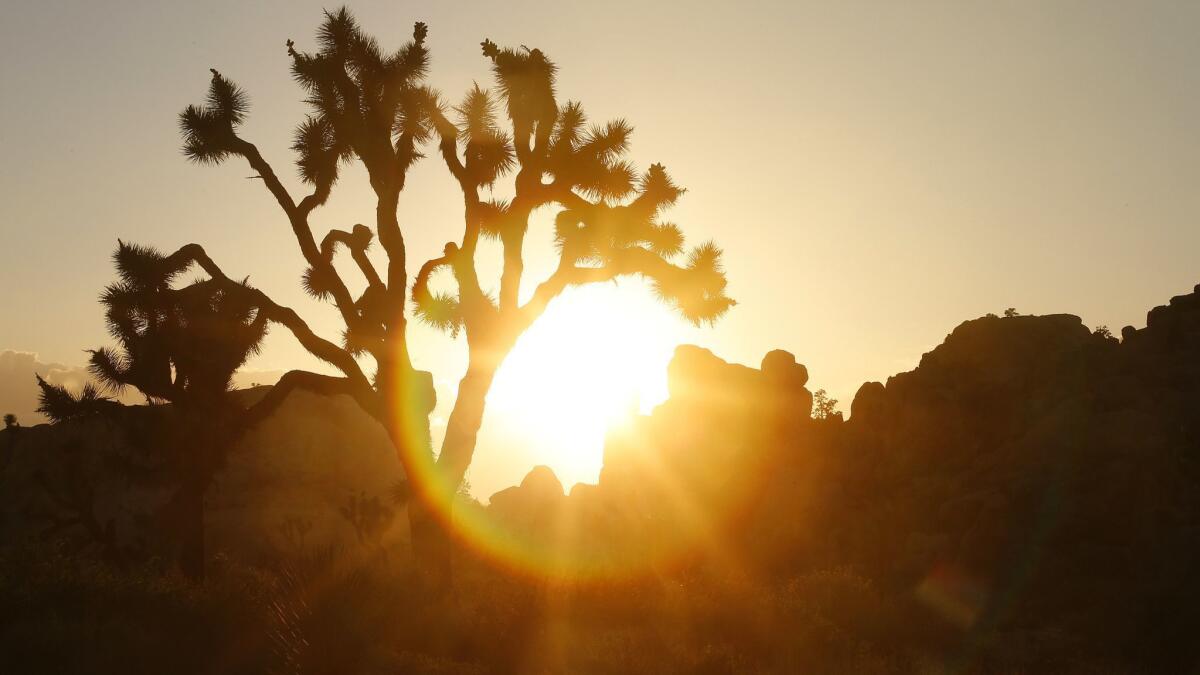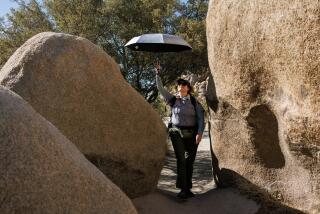Welcome to Joshua Tree. Sorry about the shutdown. Now, about the toilets …

- Share via
The federal government’s partial shutdown has granted outdoorsy travelers free access to national parks that usually charge up to $30 per carload. And with that freedom, some locals say, has come a surge in scofflaw activity and a ticklish toilet situation, especially at Joshua Tree National Park.
At Joshua Tree, Death Valley and Channel Islands national parks — all within 220 miles of Los Angeles — conditions vary as widely as the geography.
All three parks are open, and their lodgings and campgrounds are open, as are other services generally run by park concessionaire companies. But all visitor centers and many restrooms are closed and many other services have been disrupted, including bathroom maintenance and trash collection.
Those conditions pose a particular peril in Joshua Tree, locals say, because these are some of the busiest days of the year.
Rangers at Joshua Tree counted 284,398 visitors in December 2017, most in the second half of the month. Since the federal government’s partial shutdown began on Dec. 22, new arrivals are free to ignore the usual entrance fee of $30 per car.
The park’s visitor centers, water filling stations and dump stations are also closed as part of the shutdown. But its trails, campgrounds and waterless toilets, also known as vault toilets, remain open, even though there are no federal employees to maintain them.
That situation — and the multiplying trash — has spurred volunteerism, but it also has many locals nervous.
“I’ve gone through 500 rolls of toilet paper,” said Rand Abbott, a Joshua Tree rock-climber and volunteer who started restocking park toilets on Saturday, the first full day of the shutdown.
“And I’ve been emptying all the trash cans that are there and putting bags in. And then I’ve been giving out trash bags to people. I’ve probably put 60 hours in.”
Abbott, a 54-year-old Marine Corps veteran and paraplegic who is well known in the climbing community, said he has also been trying to talk visitors out of illegal fires, illegal parking, littering and other forbidden activities.
Some comply right away, but “70% of the people I’m running into are extremely rude,” Abbott said. “Yesterday, I had my life threatened two times. It’s crazy in there right now.”
Joe De Luca, a sales associate at Nomad Ventures in downtown Joshua Tree, agreed.
“It’s a free-for-all in there. Absolutely ridiculous,” De Luca said.
Besides the toilets and trash, he cited breakdowns in the campground reservation system, illegal camping practices and visitors stringing Christmas lights from delicate Joshua trees that they are supposed to leave untouched.
In the shop, De Luca said, he and colleagues are emphasizing leave-no-trace practices and recommending WAG bags — “a bag that you go to the bathroom in [and carry out] for sensitive areas where there are no bathrooms.”
De Luca thinks “the park needs to shut their gates.”
“We’re seeing so much damage. New Year’s is coming up and that’s going to be crazy.”
For Sabra Purdy, co-owner of Joshua Tree-based Cliffhanger Guides, “it’s a really inopportune time not to have anybody minding the hen house.”
But she’s no fan of closing the park. Purdy, who spent most of Wednesday guiding 14 clients on four tours, recalled the financial hardships the community suffered in the government shutdown of 2013, when the park closed for more than two weeks. This time, she said, she’s “grateful that at least the doors are open.”
But she’s also concerned. Instead of holding on to their $30, she suggests park visitors donate to an accredited charity such as Friends of Joshua Tree, which might be able to take over responsibilities that the National Park Service currently can’t.
Meanwhile, Purdy said, she and her husband, Seth Zaharias, spent most of Christmas Eve in park restrooms, “scrubbing the toilets, bleaching them, sweeping them, taking out the trash and restocking them with toilet paper.” Then her husband went out and did more bathrooms on Wednesday, she said.
But without more help from the feds, the state or county, Purdy said, she’s not sure how long she, her husband and allies such as Abbott can keep things up.
“We’re on the honor system now,” Abbott said. “It’s an opportunity for us to show how well we can take care of public lands. Unfortunately, it’s not going as well as I would like to see it go.”
At Channel Islands National Park, which is accessible only by water and air and charges no admission fee, the story is much different.
The park typically draws far fewer recreational visitors than the desert parks — just 16,746 visitors in December 2017. Still, the visitors have kept coming and camping during the shutdown, and Island Packers, the park’s transportation concessionaire, keeps bringing them.
The Ventura-based company, which runs two boats daily to Santa Cruz Island, is operating by its usual schedule, carrying day visitors and overnight campers (who have long been required to pack out their own trash), said Cherryl Connally, co-owner of Island Packers.
As of Wednesday afternoon, the company’s Santa Cruz trips were sold out through Saturday. Whale-watching and Anacapa itineraries were also doing well, Connally said.
Connally said Island Packers and Santa Barbara Adventure Co. (a kayak tour company) had taken over the job of shipping and replenishing toilet paper on Santa Cruz Island.
“We have a good paperwork relationship there,” she said.
In Death Valley National Park, which attracted 94,320 visitors in December 2017 and usually charges $30 per car per week, lodgings at Furnace Creek, Stovepipe Wells and Panamint Springs remain open, as do neighboring concession campgrounds and their restrooms.
The popular Furnace Creek, Sunset, Texas Springs, Mesquite Springs and Emigrant campgrounds are open too — but all of their restrooms are closed. The Park Service is urging visitors to “pack out all human waste.” Also, no reservation systems are in place.
Sheila Burkhart, accounting coordinator for Death Valley Lodging Co. at Stovepipe Wells, said that 190-space campground there was about 75% full on Christmas Day, with park concessionaires cleaning bathrooms and emptying trash. A few guests even braved the outdoor swimming pool, Burkhart said.
“We might be a little slower” than last year, Burkhart said, but visitors “are pretty happy. A lot of our foreign guests don’t understand a government shutdown, but they’re happy they’re able to see some parts of the park, that it isn’t completely closed.”
Follow Reynolds on Twitter: @MrCSReynolds
More to Read
Sign up for The Wild
We’ll help you find the best places to hike, bike and run, as well as the perfect silent spots for meditation and yoga.
You may occasionally receive promotional content from the Los Angeles Times.







